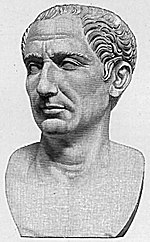Poems by Julius Caesar


Poems byJulius Caesarare mentioned by several sources in antiquity.[1]None are extant.
Plutarchsays that verse compositions were among the entertainments Caesar offered theCilician pirateswho captured him as a young man in 75 BC.[2]Plinyplaces "thedivine Julius"on his list of serious men who wrote not-so-serious poems.[3]Caesar'sDicta Collectanea,a collection of his memorable quotations, is assumed to have contained quotations from his verse as well as prose works.[4]
The titles of two works Caesar wrote as a young man are known, aLaudes Herculis( "Praises ofHercules") and the verse tragedyOedipus;their planned publication by the librarian Pompeius Macer was squelched by a "short and simple" — or perhaps "curt and direct"[5]— letter from Caesar's heirAugustusas incompatible with hisprogram of deification.A third title,Iter( "The Journey" ), dates from 46 BC, composed during a 24-day trip from Rome toSpainduring thecivil war.[6]This verse travelogue may have been modeled afterLucilius's poem about a trip toSicily.[7]Caesar's choice of writing as a pastime in prelude to the decisive and brutalBattle of Mundaillustrates the dual preoccupations of theLate Republicanaristocrat, with militarism and political power-plays balanced by elite intellectual and aesthetic aspirations.[8]
Surviving texts
[edit]A single incomplete line survives that might come from theIter,quoted byIsidore of Seville[9]in discussing the wordunguentum,"ointment":
Certain unguents, however, are referred to by place of origin. An example istelinum,[10]as Julius Caesar notes when he says 'We lubricate our bodies with soothingtelinum.' This was concocted on the island of Telos, which is one of theCyclades.
The quoted phrasecorpusque suaui telino unguimusis part of ascazonoriambic trimeter.[11]Its author has also been identified asC. Iulius Caesar Strabo,the dictator's uncle.[12]
In hisLife ofTerence,Suetoniuspreserves six lines ofdactylic hexameterby Caesar praising the Roman playwright, along with a more lukewarm assessment byCicero.[13]These two verse passages, with their similarity of purpose and wording, may have resulted from a school assignment, since both men studied with the teacher and grammarianGnipho.[14]As such, Caesar's lines are probably not to be taken too seriously as literary criticism, but his notice of Terence as "lover of a pure conversational style"[15]points toward Caesar's own stylistic predilections and linguistic nationalism.[16]
Reception
[edit]Tacitusconsidered their loss a happy accident for thedictator'sliterary reputation:[17]
For Caesar andBrutuswrote poems, and put them in their friends' libraries too. They were no better thanCicero,but have been more lucky, for their poetry is less known.[18]
References
[edit]- ^Pliny,Natural History19.8.144;Tacitus,Dialogus de oratoribus21;Suetonius56;Nonius Marcellusfr. 15;Isidorus,Etymologiae4.12.7;Firmicus Maternus,Matheseos2. pr. 2.
- ^Plutarch,Life of Caesar2, Bill Thayer's edition atLacusCurtiusonline.
- ^Pliny,Epistulae5.3.5, Latin text atThe Latin Library.
- ^Gian Biagio Conte,Latin Literature: A History(Johns Hopkins University Press, 1994), p. 226online.
- ^Brevis et simplex.
- ^Suetonius,Julius Caesar56, Bill Thayer's edition at LacusCurtiusonline.
- ^Lucilius 3; Courtney,Fragmentary Latin Poets,p. 187.
- ^Llewelyn Morgan, "Escapes from Orthodoxy: Poetry of the Late Republic," inLiterature in the Roman World(Oxford University Press, 2000), pp. 336–339online.
- ^Isidore of Seville,Etymologiae4.12.7, Bill Thayer's edition of the Latin text at LacusCurtiusonline.
- ^"A fragrant ointment made fromfenugreek":Oxford Latin Dictionary(Oxford: Clarendon Press, 1982, 1985), p. 1911.
- ^Courtney,Fragmentary Latin Poets,p. 187.
- ^Priscilla Throop,Isidore of Seville'sEtymologies:Complete English Translation(2005), notes to XIIonline;William D. Sharpe, "Isidore of Seville: The Medical Writings,"Transactions of the American Philosophical Society54 (1964), p. 63online.Michael von Albrechttakes no position on the attribution of this line, but notes that Caesar was likely influenced by his uncle; seeA History of Roman Literature: From Livius Andronicus to Boethius(Brill, 1997), p. 409online.
- ^Suetonius,Life of Terence7.
- ^Courtney,Fragmentary Latin Poets,p. 155.
- ^Puri sermonis amator.
- ^Courtney,Fragmentary Latin Poets,pp. 153–154; Lindsay Hall, "RatioandRomanitasin theBellum Gallicum,"inJulius Caesar as Artful Reporter: The War Commentaries as Political Instruments(Classical Press of Wales, 1998).
- ^Unless otherwise noted, citations of primary sources and general overview from Edward Courtney,The Fragmentary Latin Poets(Oxford: Clarendon Press, 1993), pp. 153–155 and 187–188.
- ^Tacitus,Dialogus21.6, English translation (including remarks on Caesar as a public speaker) by W. Hamilton Fyfe,Tacitus: Dialogus, Agricola, and Germania(Oxford: Clarendon Press, 1908), p. 22online;Latin with notesonline.
Bibliography
[edit]- Courtney, Edward.The Fragmentary Latin Poets.Oxford: Clarendon Press, 1993.
